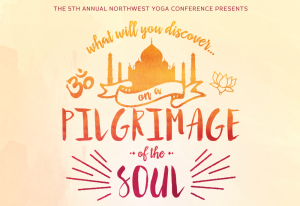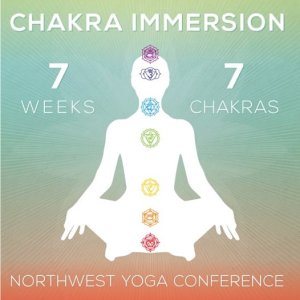by Jill Rivera Greene, Conference Blogger
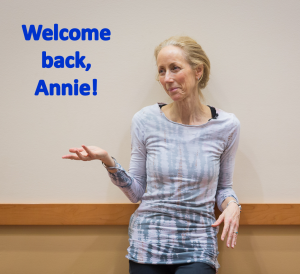 Annie Carpenter combines the wisdom of four decades of deep practice with a uniquely no-nonsense style. Her keen insights on alignment are intermixed with a sharp wit that, at last year’s conference, kept packed rooms full of yogis laughing (when we weren’t frantically taking notes).
Annie Carpenter combines the wisdom of four decades of deep practice with a uniquely no-nonsense style. Her keen insights on alignment are intermixed with a sharp wit that, at last year’s conference, kept packed rooms full of yogis laughing (when we weren’t frantically taking notes).
The conference team was beyond thrilled when Annie agreed to return this year for a command performance—and judging from the way her workshops are filling up, we’re not the only ones.
You attend a lot of yoga events around the country. What makes NWYC stand out?
Its class sizes are smaller than at some events, which gives it a kind of intimacy. I see the same students over and over in my classes throughout the weekend, so the conference almost feels like a workshop-intensive. There’s something special about that for me as a teacher. I can really get a sense of the students’ practice and see how best to help them. For their part, the students begin to get my language, my rhythm, my perspective. I feel like they get a deeper experience. And that’s lovely, that’s a real gift.
With so much travel, how do you maintain balance on the road?
You just have to keep your practice up. Especially when you come in from a long trip, you’re jet lagged, and it feels like 4 a.m. but it’s really 10 a.m. and time to teach. You have to fit your practice in. Even if that means you practice for a half hour in the morning and come back to your mat for an hour later in the day.
The other thing that is hard but essential is to eat well. It can be really hard to get the right foods, enough fresh vegetables when you’re on the road. You have to work at it, but it’s worth it. If you eat well, you feel better.
For me, it’s also important to maintain enough time at home, to support my own relationship and my relationship with my students. There can definitely be a point where there’s too much travel.
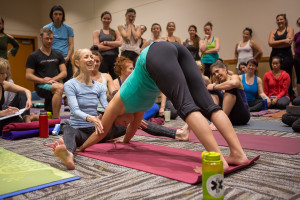 I attended your shoulder workshop last year, and I was blown away by your approach to alignment and stabilization, including pointing out common practices that can lead to injury. What are some of the unsafe habits you encounter in classes?
I attended your shoulder workshop last year, and I was blown away by your approach to alignment and stabilization, including pointing out common practices that can lead to injury. What are some of the unsafe habits you encounter in classes?
The question is really, how can we practice in such a way that we maintain mindfulness? Whether you’re talking about a shoulder issue, a low back, a knee … if you can sustain mental focus, if you can continue to be mindful not just in the poses but in your transitions between poses, then you’re very unlikely to get hurt. What happens is we tend to jump ahead. Our mind thinks of something else, or we’re thinking about how this pose ought to be or how it used to be, and we pull ourselves out of the present moment.
So one of the hallmarks of a really good teacher is presenting in such a way that the practice demands mindfulness in every moment on the part of the students.
Yes! I definitely notice that when I am looking around the room, thinking about what a pose looks like for someone else, I get pulled out of my own practice.
Right. That happens to everyone. It’s very common.
One way of looking at advanced practice is letting go of what it should look like, what you wish it looked like, what it looks like for someone else. If a thought takes you out of what you’re doing, out of mindfulness, then even the strongest and most experienced practitioner is at risk. The practice is about staying present, not about what poses you can do.
If a culture is all about how deep you can get in a pose, or how long you can balance, then we’re really doing a disservice to our students, to ourselves, and to yoga. That’s not what yoga is about. This practice was developed to create mental focus and stamina, so that we can answer the bigger questions. Not, “Should there be three feet or four feet between the feet in Trikonasana?” but, “Who am I? Why am I on this planet?” and “What can I do to serve the truth of life?” The only way we get there is by learning how to concentrate, how to pay attention rather than judge and expect.
Can you talk about an influential experience of pilgrimage?
Two things come to mind.
The first is my time studying with [Shri K.] Pattabhi Jois in India in 1997. It really was a wonderful thing to make the choice to take two months off work and go to India, at a time when not as many people were doing that sort of thing. It meant really committing myself to the practice and to myself as a practitioner, surrendering to a teacher at a different level.
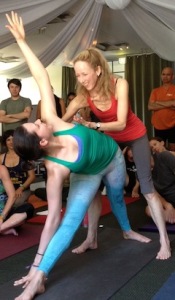 I think that making that choice—that commitment to leave my home, my job, and my friends behind for two solid months—was almost as important as the advances I made in the practice during that time (and those were considerable). To put your practice first is a powerful thing. It was a watershed moment.
I think that making that choice—that commitment to leave my home, my job, and my friends behind for two solid months—was almost as important as the advances I made in the practice during that time (and those were considerable). To put your practice first is a powerful thing. It was a watershed moment.
The other experience I was thinking about … well, sometimes shit happens and we do get injured. I had a fall, and I ruptured one of the ligaments in my knee. I had to have surgery, and then not bear weight on the knee for months. It was another kind of pilgrimage to come back from that. You never really know how much you’ve lost in terms of flexibility, strength, or sensitivity, or how much you’re going to get back.
I think all of us can relate to the idea of a pilgrimage of returning to the practice, whether from an injury, grief, or an illness. I remember when a very dear friend died, almost 9 years ago, and I was in such grief that it didn’t make sense to do my practice as it was. That was a kind of pilgrimage, too—to let go, to surrender to the situation, to the fact that I didn’t have energy, time, or focus for the practice. And then to slowly, slowly come back.
So I think there are many things that happen to us, whether they are physical injuries, emotional upsets, illnesses, even the birth of a child. To see what is happening and make the pilgrimage to return to your practice the way it was … maybe … or maybe differently. That’s a leap of faith.
You’re going to be on our keynote panel, The Journey of Self-Discovery Through Yoga Practice. I think there’s a tendency to think that there will be some end-point to this journey, or that there’s some place to “get to.” What would you say to that, after four decades of practice?
The truth of the matter is, it’s endless. I embrace the Buddhist philosophy on this question. The big teaching of the Buddha is, “Shit happens.” (I’m paraphrasing here.) Life is difficult, things change, we lose things. So every day is an opportunity to open your eyes, open your heart, and accept what is.
Yes, we all have good, easy days, but the truth is that we’re constantly on a pathway to keep our hearts open and accept whatever it is that comes. I don’t think there’s an endpoint to that. Rain or shine, love or death, fear or excitement … every day something new is going to present itself, whether on your mat, or walking down the street with your family. Yoga is a place for us to practice being open to whatever it is that comes, and approaching it with as much kindness and love as we can.
For more about Annie, read last year’s interview.
There are still a few spots available in many of Annie’s workshops, including her all-day intensive on Thursday. Claim your place now!
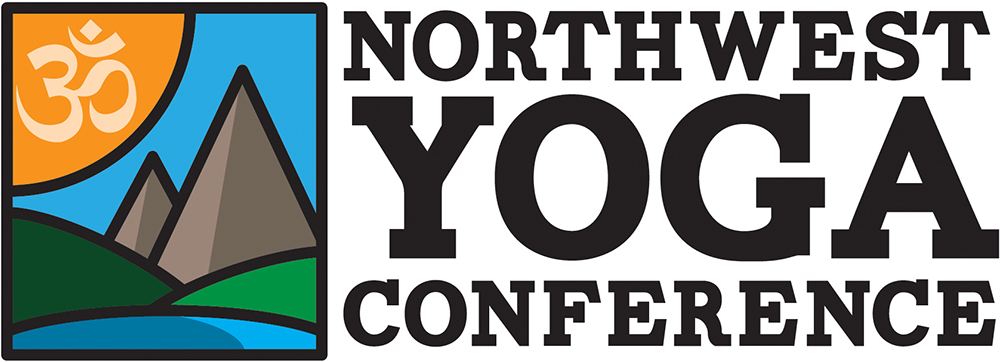
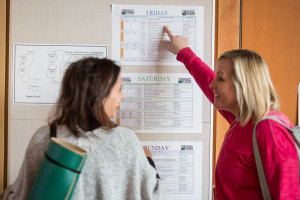
 I love studying with Annie Carpenter and appreciate her dedication to teaching in a style that keeps the body in a safe alignment while keeping the bigger picture of the practice in mind. I am really looking forward to her yoga workshop on backbends as I know it will be full of useful insights into practicing backbends safely! -Melissa Phillips-Hagedorn, Conference Founder/Director
I love studying with Annie Carpenter and appreciate her dedication to teaching in a style that keeps the body in a safe alignment while keeping the bigger picture of the practice in mind. I am really looking forward to her yoga workshop on backbends as I know it will be full of useful insights into practicing backbends safely! -Melissa Phillips-Hagedorn, Conference Founder/Director Although I love the yoga workshops that deepen and expand my practice of asana, I am most excited this year about those that explore other aspects of yoga. The opportunity to hear Aadil Palkhivala speak on living the eight limbs, make my own mala with healing stones, and explore devotional chanting with Janet Stone … all in one place … is what makes the Yoga Conference such a special experience for me. I can’t wait! – Jill Riveria Greene, Conference Blogger
Although I love the yoga workshops that deepen and expand my practice of asana, I am most excited this year about those that explore other aspects of yoga. The opportunity to hear Aadil Palkhivala speak on living the eight limbs, make my own mala with healing stones, and explore devotional chanting with Janet Stone … all in one place … is what makes the Yoga Conference such a special experience for me. I can’t wait! – Jill Riveria Greene, Conference Blogger The Northwest Yoga Conference always has such an amazing and wide variety of yoga workshops that it is difficult to choose just one! I am excited to explore new ideas for how to lift-off in Arm Balances 101 with Annie Carpenter, and to learn more about the elements of our hands in Mudras: Expressions of the Hand with Kimi Marin. -Torrey Kaminski, Marketplace Coordinator
The Northwest Yoga Conference always has such an amazing and wide variety of yoga workshops that it is difficult to choose just one! I am excited to explore new ideas for how to lift-off in Arm Balances 101 with Annie Carpenter, and to learn more about the elements of our hands in Mudras: Expressions of the Hand with Kimi Marin. -Torrey Kaminski, Marketplace Coordinator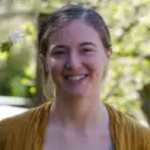
 With all of the wonderful teachers and genius workshops, it was wonderful agony trying to choose which classes to attend at NWYC! Most of all, I’m looking forward to Sadie Nardini’s “Next-Level Authenticity, Anatomy, and Abundance” all-day intensive. I teach a wide range of yoga styles, and it will be wonderful to hear advice on how to maintain my authentic voice while still delivering what my students need most. – Carly Hayden, Swag Bag Coordinator
With all of the wonderful teachers and genius workshops, it was wonderful agony trying to choose which classes to attend at NWYC! Most of all, I’m looking forward to Sadie Nardini’s “Next-Level Authenticity, Anatomy, and Abundance” all-day intensive. I teach a wide range of yoga styles, and it will be wonderful to hear advice on how to maintain my authentic voice while still delivering what my students need most. – Carly Hayden, Swag Bag Coordinator I am really looking forward to Sadie Nardini’s workshop ‘Bust Sabotage and Rock Who You Are’. As a small business owner and creative enthusiast, vulnerability and doubt sometimes cloud my thoughts and can distract me from my core truth. I am excited to learn about Sadie’s techniques in a high energy, yet rooted – soul filled workshop! – Lindsay Baugh, Graphic Design
I am really looking forward to Sadie Nardini’s workshop ‘Bust Sabotage and Rock Who You Are’. As a small business owner and creative enthusiast, vulnerability and doubt sometimes cloud my thoughts and can distract me from my core truth. I am excited to learn about Sadie’s techniques in a high energy, yet rooted – soul filled workshop! – Lindsay Baugh, Graphic Design Which to choose? I am definitely excited that Sadie Nardini will be here and am looking forward to taking a yoga workshop with her. But also looking forward to another class with Annie Carpenter and my ‘bestie’ Jill Knouse. But then there are workshops with Naomi Jones and Kimi Marin, who were volunteers with us in the past, so that’s cool to see them on the other side of the conference. And the yoga sutras with Silvia Mordini is always a good topic. So, I don’t know! – Julie DiRusso, Volunteer Coordinator
Which to choose? I am definitely excited that Sadie Nardini will be here and am looking forward to taking a yoga workshop with her. But also looking forward to another class with Annie Carpenter and my ‘bestie’ Jill Knouse. But then there are workshops with Naomi Jones and Kimi Marin, who were volunteers with us in the past, so that’s cool to see them on the other side of the conference. And the yoga sutras with Silvia Mordini is always a good topic. So, I don’t know! – Julie DiRusso, Volunteer Coordinator